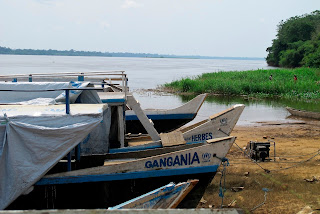This could end up being just another blog post about the
ubiquity of communication technology, and the no-longer odd experience of being
instantly in touch with friends and loved ones thousands of miles and multiple
time zones away. But I will give it a shot anyway.
Brazzaville felt very far from Seattle: incredibly hot and
humid for someone grown accustomed to the mild, temperate Pacific Northwest.
But I had some Internet connectivity, as long as the electricity was on. It
wasn’t always on, but the outages were not so severe that I could not check
email, or Facebook, or do a bit of basic research when necessary. So I would
post the occasional humorous Facebook update about my encounters with strange
fruits, or enormous flying insects, or basic learning experiences in a new
place. I also had a simple cell phone (not “smart” but able to make calls and
send texts), and with the 10-hour time difference I could have end-of-day,
beginning-of-day conversations or texts with home. Thus, with all of this
communication, the far often felt quite near, and loved ones at home were able
to stay current with my experiences as they happened.
Traveling to Impfondo meant giving up this immediate
connection, as there were only two places I could get online and often the
satellite connection was out due to weather or other technical problems. The
cell phone service in the area was also down almost the entire time we were
there, and there was no electricity on the grounds of the cathedral, where I
was staying with a group of nuns, because the electric wires had been stolen
earlier. I grew to enjoy the relative quiet imposed by this fast from
communication technology, and the space it gave my mind to wander.
Then, one morning, I came into the parish house next to the
cathedral, where I had been having my breakfast every day, and the television
on the wall in the breakfast room was turned on. Apparently, the priest and his
staff usually ate breakfast to the early morning news broadcasts from France, a
fact I had not been aware of due to the electrical outage. That morning in late
December, I was not paying a great deal of attention until I heard the word
“Connecticut” in the midst of a stream of rapid-fire French from a news anchor.
I looked up at the screen and saw night, flashing police lights, and police
milling around with crowds of people.
I struggled at first to catch the gist of the broadcast, but
there were guns, and dead…and children. Everyone at breakfast was watching,
buttered bread suspended, café au lait growing cold. They turned to look at me,
wondering if I could explain what they were hearing. Someone changed the
channel, and it was a different news program, no longer a live broadcast from
Newtown but a panel of experts, including a French academic expert on America,
discussing the latest example of violence and America’s “gun culture.” The
number of dead, the ages of the children, the age of the shooter, and the
recurring question, why?
No one at the table was rude enough to put me on the spot,
demand an answer to that question from the conveniently near-at-hand American
“expert.” But they wondered, and they asked, does this happen often? Do you
feel afraid in your country?
No one commented on the rather cruel coincidence that one
project I was in Impfondo to observe, funded by UNICEF, was a violence
prevention project aimed at reducing violence against women and children in
Congo.











